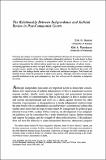| dc.description.abstract |
Following the collapse of communist rule in Central and Eastern Europe and the former Soviet Union, constitutional designers codified rules establishing independent judiciaries. To what degree do these constitutional and statutory guarantees of independence reflect the actual behavior of courts? Our analysis demonstrates that official judicial power does not predict expressions of judicial review— overturning legislation in whole or in part. Rather, exogenous factors, including economic conditions, executive power, identity of the litigants and legal issues, influence the likelihood that courts will nullify laws. Our findings should caution both scholars and institutional designers. Both formal and informal factors create the parameters in which courts operate. Although courts have become more powerful institutions in the post-communist era, they face a diverse set of constraints on independ- ent action. |

